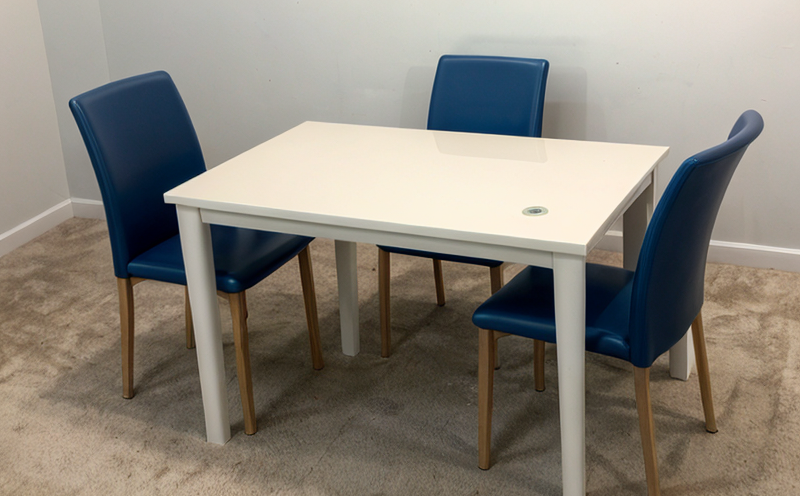UNE EN 12722 Resistance to Dry Heat Testing of Furniture Plastics
The UNE EN 12722 standard specifies the resistance to dry heat testing method for plastics used in furniture and interior applications. This test is critical for ensuring that materials maintain their physical properties, appearance, and functionality under prolonged exposure to high temperatures without degradation or deformation.
Plastics employed in furniture and interior design are often subjected to environmental conditions that can cause them to lose their integrity over time. The resistance to dry heat testing helps manufacturers identify which plastics will withstand these conditions effectively. This test is particularly important for ensuring the longevity of products like seating, cushions, armrests, and other components that come into direct contact with users.
The standard applies to a wide range of plastic materials used in furniture manufacturing, including polyurethane foams, thermoplastics, and engineered resins. It evaluates how these materials perform under conditions similar to those encountered during prolonged exposure to high temperatures, such as those found in tropical climates or in vehicles parked in direct sunlight.
The testing procedure involves subjecting a sample of the plastic material to a specified temperature for a defined period. The samples are typically exposed to an oven at 105°C for a duration ranging from 48 hours to 96 hours, depending on the specific requirements set out by UNE EN 12722.
Upon completion of the test, the samples undergo rigorous inspection and measurement. The primary focus is on evaluating any changes in color, texture, hardness, flexibility, or other physical properties that might indicate thermal degradation. Additionally, mechanical tests such as tensile strength and impact resistance may be conducted to assess the material's performance post-test.
Understanding the implications of this testing for quality assurance cannot be overstated. By ensuring compliance with UNE EN 12722 standards, manufacturers can guarantee that their products meet or exceed market expectations regarding durability and reliability. This is especially crucial in sectors where comfort and safety are paramount, such as automotive interiors and home furnishings.
Failure to adhere to these standards could lead to product recalls, increased warranty claims, and ultimately, damage to brand reputation. Conversely, successful compliance enhances customer trust and satisfaction, fostering long-term loyalty among consumers who value high-quality products.
Why It Matters
The importance of the UNE EN 12722 test lies in its ability to predict the long-term performance of plastics used in furniture and interior applications. By simulating real-world conditions, this testing ensures that materials maintain their integrity over extended periods under high temperatures.
- Enhanced Durability: Ensures that products retain their original form and functionality for longer durations.
- Better Customer Satisfaction: Reduces the likelihood of premature product failures, enhancing overall customer satisfaction.
- Maintained Aesthetics: Prevents color fading or textural changes that could affect the appearance of furniture over time.
- Increased Safety: Guarantees that materials used in seating and other high-contact areas do not pose risks due to thermal degradation.
In summary, compliance with UNE EN 12722 is essential for maintaining product quality and ensuring customer trust. It helps manufacturers produce reliable products that meet industry standards and consumer expectations.
Applied Standards
The resistance to dry heat testing of furniture plastics is governed by the European standard UNE EN 12722:2006. This standard provides detailed procedures for conducting tests on various plastic materials used in furniture and interior applications.
In addition to UNE EN 12722, other relevant standards include ISO 8375, which covers the determination of heat resistance by means of the pin-on-disk test. These standards complement each other, offering a comprehensive approach to evaluating plastic materials for their thermal stability and durability.
It is important for manufacturers and quality assurance teams to stay updated with any revisions or amendments to these standards, as they can impact testing procedures and acceptance criteria. Compliance with the latest versions ensures that products meet current market demands and regulatory requirements.
Benefits
- Increased Product Lifespan: Ensures that furniture plastics maintain their integrity and functionality for longer periods, enhancing customer satisfaction.
- Better Aesthetics: Prevents color fading or textural changes that could affect the appearance of furniture over time.
- Enhanced Safety: Guarantees that materials used in seating and other high-contact areas do not pose risks due to thermal degradation.
- Improved Brand Reputation: Compliance with UNE EN 12722 standards enhances brand reputation by ensuring consistent quality across products.
- Reduced Warranty Claims: By identifying potential issues early, manufacturers can minimize the number of warranty claims and associated costs.
- Competitive Advantage: Compliance with international standards positions a company as a leader in product quality and innovation.
In conclusion, the UNE EN 12722 resistance to dry heat testing is an essential tool for manufacturers of furniture plastics. It ensures that products meet high-quality standards, enhancing customer satisfaction and brand reputation while minimizing risks associated with material degradation.





